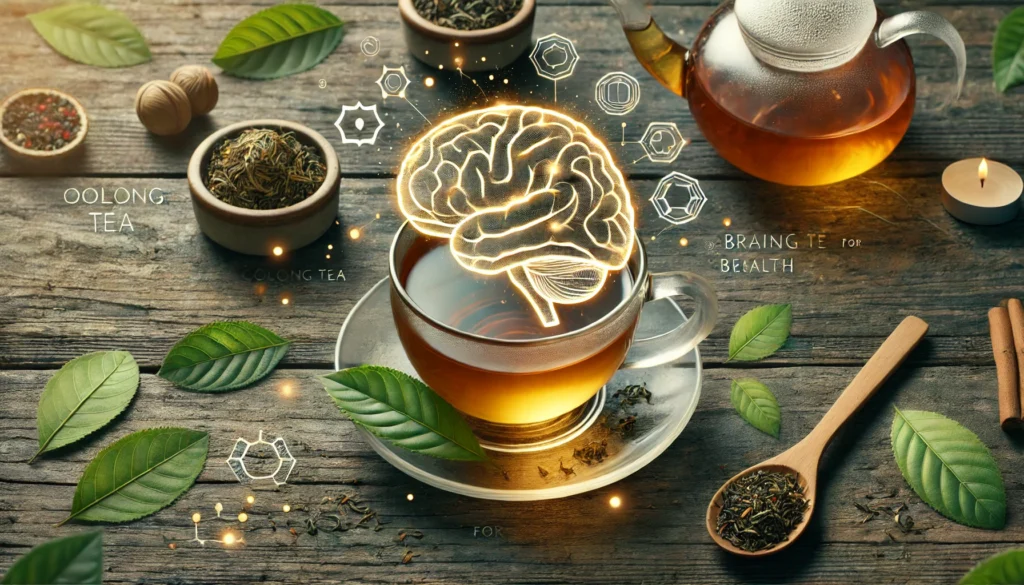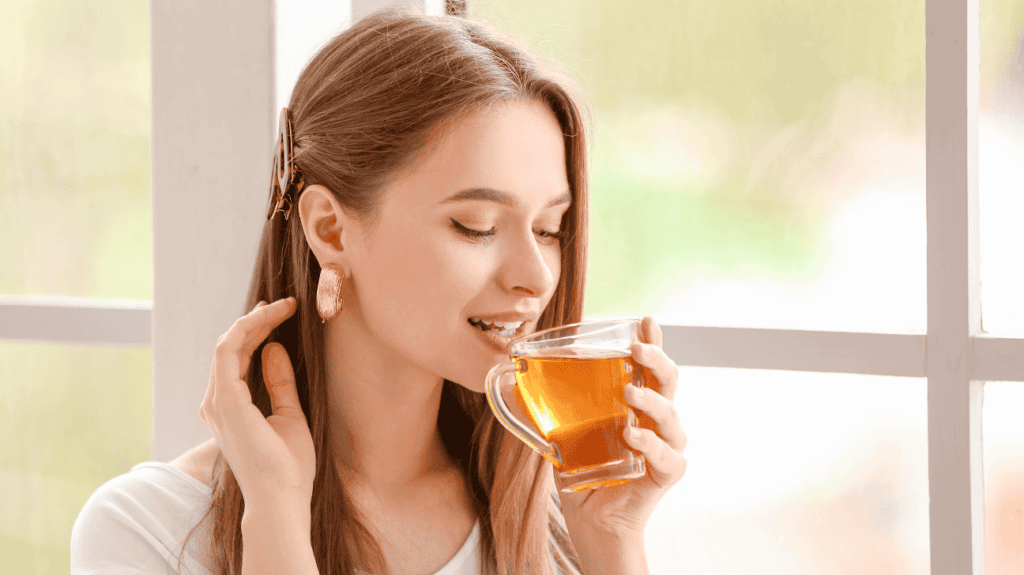Oolong tea, a traditional Chinese beverage known for its delicate flavor and unique brewing process, has gained significant attention in recent years for its potential health benefits, particularly its cognitive-enhancing properties. Derived from the Camellia sinensis plant—also the source of green and black teas—oolong tea is partially fermented, giving it a complex chemical profile that lies between the mildness of green tea and the robust flavor of black tea.
Oolong tea has long been celebrated for its potential to promote mental alertness, reduce stress, and support weight loss. Recently, research has suggested that it may also offer nootropic benefits, making it an intriguing candidate for cognitive enhancement. In this article, we explore the science behind oolong tea’s potential as a nootropic supplement, its active ingredients, mechanisms of action, proper dosage, side effects, interactions with medications and supplements, and its safe use.
You May Also Like:
Dr Emil Nutrition Lion’s Mane Reviewed: A Leading Nootropic Mushroom Product
Oolong Tea: Potential Nootropic Benefits, Dosage, Side Effects, Interactions, and Other Important Information About This Supplement is an original (NootropicsPlanet) article.
Sources of Oolong Tea
Oolong tea is traditionally sourced from the leaves of the Camellia sinensis plant, the same plant that produces green, black, and white teas. The key difference lies in how the leaves are processed. Oolong tea undergoes a unique fermentation process that is partially oxidized, which preserves both the freshness of green tea and the deep flavors of black tea. This fermentation process gives oolong tea its distinct taste, which can vary from floral and fruity to woody and roasted, depending on the degree of oxidation.
Oolong tea is primarily grown in China and Taiwan, with famous varieties such as Tie Guan Yin and Da Hong Pao originating from these regions. The cultivation and processing techniques, along with environmental factors such as altitude and soil, can all influence the chemical composition and overall quality of the tea.
Oolong Tea supports mental clarity and boosts focus—Savor Smarter Moments, Buy Now on Amazon!

Chemistry of Oolong Tea
Oolong tea contains a variety of bioactive compounds that contribute to its flavor, health benefits, and potential cognitive-enhancing properties. Among these, polyphenols, caffeine, amino acids, and alkaloids play prominent roles in its effects on the body and brain.
- Polyphenols: Oolong tea is rich in polyphenolic compounds, including catechins, theaflavins, and thearubigins, which are potent antioxidants. These compounds help protect cells from oxidative stress, which could damage brain tissue and contribute to cognitive decline. The balance of polyphenols in oolong tea is different from that of green or black tea, which may contribute to its unique cognitive effects.
- Caffeine: Like green and black tea, oolong tea contains caffeine, a central nervous system stimulant known for its ability to enhance alertness, attention, and cognitive performance. The caffeine content of oolong tea is generally moderate, ranging from 30 to 50 milligrams per 8-ounce serving, depending on the type of tea and brewing time. The moderate caffeine content of oolong tea makes it an attractive option for those seeking a cognitive boost without the jitteriness often associated with higher doses of caffeine found in coffee.
- Amino Acids: Oolong tea contains amino acids such as L-theanine, which is believed to have calming effects that can counterbalance the stimulating effects of caffeine. L-theanine works by promoting the production of GABA (gamma-aminobutyric acid), a neurotransmitter that reduces neuronal excitability and fosters relaxation. The combination of caffeine and L-theanine in oolong tea may provide a balanced nootropic effect, enhancing alertness and focus while reducing stress and anxiety.
- Alkaloids: Oolong tea also contains theobromine, a compound found in cocoa and tea that has mild stimulant effects. Theobromine may improve blood flow, enhance mood, and contribute to the tea’s cognitive-enhancing properties.
Physiological Mechanisms of Oolong Tea in the Body and Brain
The active compounds in oolong tea work synergistically to exert a variety of physiological effects that may enhance brain function and cognitive performance. These effects are primarily mediated through the antioxidant and anti-inflammatory properties of polyphenols, the cognitive-enhancing effects of caffeine and L-theanine, and the overall neuroprotective properties of oolong tea.
- Antioxidant Protection: The polyphenols in oolong tea, particularly catechins, have powerful antioxidant properties that help neutralize reactive oxygen species (ROS) in the brain. ROS are highly reactive molecules that can damage cellular structures, including DNA, proteins, and lipids. Chronic oxidative stress has been implicated in neurodegenerative diseases such as Alzheimer’s and Parkinson’s, as well as in cognitive decline. By reducing oxidative damage, oolong tea may help protect brain cells and promote long-term brain health.
- Caffeine-Boosted Cognitive Performance: Caffeine, one of the most widely studied nootropic compounds, enhances cognitive function by increasing dopamine and norepinephrine release in the brain, which helps improve attention, focus, and learning. The moderate caffeine content of oolong tea provides a gentle cognitive boost without overwhelming the body, making it a suitable option for individuals who are sensitive to high doses of caffeine.
- Neuroprotective Effects of L-Theanine: L-theanine, the amino acid found in oolong tea, has been shown to promote relaxation without sedation. L-theanine enhances alpha brain wave activity, which is associated with a calm, yet alert, state of mind. When combined with caffeine, L-theanine may improve cognitive performance by promoting focus and attention while reducing the anxiety or restlessness that may sometimes accompany caffeine consumption.
- Anti-Inflammatory Effects: Chronic inflammation is another factor that contributes to cognitive decline and neurodegeneration. Studies suggest that the polyphenols in oolong tea may help reduce inflammation in the brain by inhibiting the activity of inflammatory cytokines. This anti-inflammatory effect may further contribute to the brain-protective properties of oolong tea.

Nootropic Benefits of Oolong Tea
Oolong tea’s combination of polyphenols, caffeine, and amino acids makes it a promising nootropic. While the research specifically investigating oolong tea’s cognitive-enhancing effects is limited, the evidence supporting its active compounds suggests that oolong tea may offer several nootropic benefits.
- Enhanced Cognitive Function: The combination of caffeine and L-theanine in oolong tea is believed to improve cognitive performance, particularly in areas such as attention, focus, and memory. Studies on other types of tea, including green and black tea, suggest that moderate caffeine intake may improve mental performance, and oolong tea’s moderate caffeine content makes it a viable option for a cognitive boost.
- Stress Reduction and Mental Clarity: L-theanine in oolong tea has been shown to reduce stress and anxiety, which may improve overall mental clarity and focus. This calming effect may help individuals avoid the cognitive disruptions caused by stress, which could impair memory, concentration, and problem-solving skills.
- Mood Enhancement: The caffeine in oolong tea stimulates the release of dopamine and serotonin, neurotransmitters associated with mood regulation. The stimulating effects of caffeine, combined with the mood-stabilizing effects of L-theanine, may help enhance overall mood, reduce feelings of fatigue, and improve motivation and cognitive performance.
- Neuroprotection and Long-Term Brain Health: The antioxidant and anti-inflammatory properties of oolong tea may help protect the brain from age-related cognitive decline. By reducing oxidative stress and inflammation, oolong tea may offer long-term brain protection, potentially reducing the risk of neurodegenerative diseases such as Alzheimer’s disease.

Dosage and Supplementation Guidelines
The ideal dosage of oolong tea will depend on individual preferences, tolerance to caffeine, and specific health goals. While there is no established daily dosage for oolong tea as a nootropic supplement, research on its active compounds provides some guidance.
- General Dosage: A typical serving of oolong tea is 8 ounces (approximately 240 milliliters) and contains around 30-50 milligrams of caffeine. For most individuals, consuming 1-3 cups of oolong tea per day is safe and may provide a mild cognitive boost without excessive side effects. Drinking more than this amount may increase caffeine intake, potentially leading to side effects such as jitteriness or insomnia.
- Nootropic Dosage: For cognitive enhancement, the recommended dosage of caffeine is typically between 100 and 200 milligrams per day. Since oolong tea contains moderate amounts of caffeine, consuming 2-4 cups per day should provide sufficient cognitive benefits. If combining oolong tea with other nootropic supplements, it is important to monitor total caffeine intake to avoid overstimulation.
Side Effects and Safety
Oolong tea is generally considered safe for most people when consumed in moderate amounts. However, like any supplement, it may have side effects, particularly in individuals sensitive to its active compounds.
- Caffeine-Related Side Effects: Excessive caffeine consumption may lead to side effects such as insomnia, jitteriness, increased heart rate, and digestive disturbances. Individuals who are sensitive to caffeine should limit their intake of oolong tea or opt for lower-caffeine tea varieties.
- Stomach Irritation: Tea, including oolong tea, contains tannins, which may irritate the stomach lining in some individuals, particularly when consumed on an empty stomach. To minimize this risk, it is recommended to drink oolong tea with food.
- Interaction with Medications: Oolong tea may interact with certain medications, particularly those that affect blood pressure or blood sugar levels. For example, caffeine may interfere with blood pressure medications, while the polyphenols in oolong tea may interact with medications that are metabolized by the liver. Individuals on medication should consult their healthcare provider before consuming oolong tea regularly.

Interactions with Other Supplements and Medications
Oolong tea, like other caffeinated beverages, may interact with certain supplements and medications. Common interactions include:
- Stimulants: Combining oolong tea with other stimulants, such as caffeine from coffee or energy drinks, may lead to overstimulation, causing side effects like jitteriness or increased heart rate.
- Blood Pressure Medications: Caffeine may elevate blood pressure, so individuals taking medications for hypertension should monitor their blood pressure while consuming oolong tea.
- Blood Sugar Medications: The polyphenols in oolong tea may affect blood sugar levels, so individuals with diabetes should consult their healthcare provider before incorporating oolong tea into their routine.
Oolong Tea’s Potential for Cognitive and Mental Wellness
Oolong tea, with its unique combination of caffeine, polyphenols, and amino acids, offers promising potential as a nootropic supplement. It may improve cognitive performance, enhance mood, reduce stress, and protect brain health over the long term. While research is still ongoing, the current evidence suggests that moderate consumption of oolong tea could provide valuable cognitive and mental wellness benefits.
Additionally, its antioxidant and anti-inflammatory properties may help protect the brain from age-related decline, potentially reducing the risk of neurodegenerative diseases. However, as with any supplement, it is important to be mindful of individual tolerance and potential interactions with medications. By consuming oolong tea responsibly and in moderation, it could become a simple yet effective addition to a holistic approach to brain health.

References:
- Health Benefits of Oolong Tea. Retrieved from: https://www.health.com/oolong-tea-8363364
- What are the health benefits of oolong tea? Retrieved from: https://www.medicalnewstoday.com/articles/319276
- Does Drinking Oolong Tea Have Health Benefits? Retrieved from: https://www.verywellhealth.com/oolong-tea-benefits-nutrients-and-more-7548854
- Consideration of Oolong Tea Effect on Senior’s Cognitive Performance. Retrieved from: https://ieeexplore.ieee.org/abstract/document/9090704
- Oolong tea: A critical review of processing methods, chemical composition, health effects, and risk. Retrieved from: https://www.tandfonline.com/doi/abs/10.1080/10408398.2017.1347556
Important Note: The information contained in this article is for general informational purposes only, and should not be construed as health or medical advice, nor is it intended to diagnose, prevent, treat, or cure any disease or health condition. Before embarking on any diet, fitness regimen, or program of nutritional supplementation, it is advisable to consult your healthcare professional in order to determine its safety and probable efficacy in terms of your individual state of health.
Regarding Nutritional Supplements Or Other Non-Prescription Health Products: If any nutritional supplements or other non-prescription health products are mentioned in the foregoing article, any claims or statements made about them have not been evaluated by the U.S. Food and Drug Administration, and such nutritional supplements or other health products are not intended to diagnose, treat, cure, or prevent any disease.


